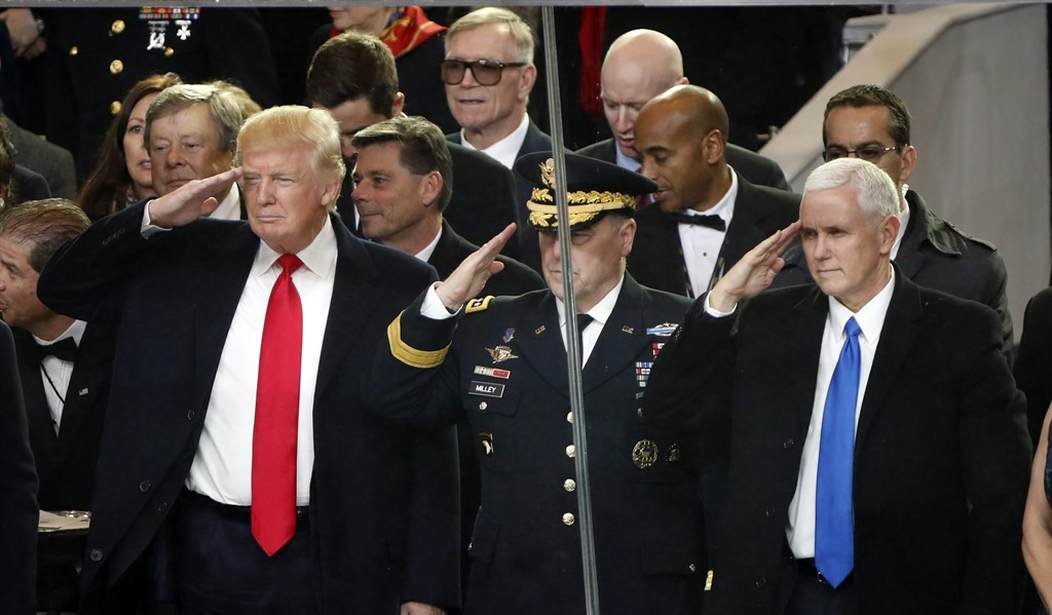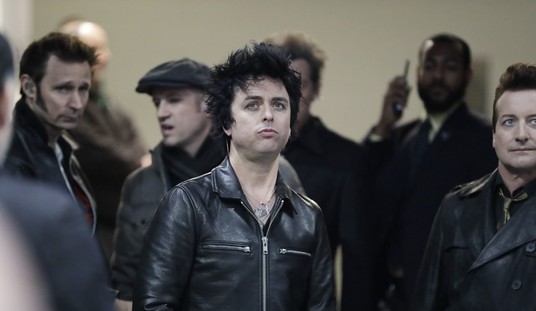The New Yorker writers Susan Glasser and Peter Baker have a new book coming out called “The Divider: Trump in the White House, 2017-2021.” A section of the book has been released by The New Yorker called “Inside the War Between Trump and his Generals. The article is designed to make Trump look unhinged because that is all the thing right now, as the left is crapping its drawers at the thought of a second Trump term in the White House. What I think it shows more than an out-of-control Trump is a pampered, self-righteous, and self-indulgent clique of military officers who can no longer be relied upon to do anything they don’t want. I’ll have more on that later; let’s look at some quotes.
The Independence Day Parade Kerfuffle
But the gulf between Trump and the generals was not really about money or practicalities, just as their endless policy battles were not only about clashing views on whether to withdraw from Afghanistan or how to combat the nuclear threat posed by North Korea and Iran. The divide was also a matter of values, of how they viewed the United States itself. That was never clearer than when Trump told his new chief of staff, John Kelly—like Mattis, a retired Marine Corps general—about his vision for Independence Day. “Look, I don’t want any wounded guys in the parade,” Trump said. “This doesn’t look good for me.” He explained with distaste that at the Bastille Day parade there had been several formations of injured veterans, including wheelchair-bound soldiers who had lost limbs in battle.
Kelly could not believe what he was hearing. “Those are the heroes,” he told Trump. “In our society, there’s only one group of people who are more heroic than they are—and they are buried over in Arlington.” Kelly did not mention that his own son Robert, a lieutenant killed in action in Afghanistan, was among the dead interred there.
“I don’t want them,” Trump repeated. “It doesn’t look good for me.”
The first thing that comes to mind is, “do I believe this?” I’ve been in parades, like the Veterans Day Parade in San Francisco, the Allied Forces Day Parade and July 4th Parade in Berlin, and other smaller affairs. I was in the crowd during Norm Schwarzkopf’s triumphant Desert Storm Parade. But, do you know what I never saw? A march unit composed of disabled or wounded veterans. Why would you want that? A place of honor on the reviewing stand? Sure thing. But why would you include civilians in a parade that will be primarily a military affair? And why would you limit participation to disabled veterans and not include all veterans? This sounds like a “too good to check” story as it dovetails with the Washington Post report in the middle of the 2020 presidential campaign that President Trump had referred to dead and wounded members of the Armed Forces as “losers” and “suckers.”
Trump’s Demand for Total Loyalty
It turned out that the generals had rules, standards, and expertise, not blind loyalty. The President’s loud complaint to John Kelly one day was typical: “You fucking generals, why can’t you be like the German generals?”
“Which generals?” Kelly asked.
“The German generals in World War II,” Trump responded.
“You do know that they tried to kill Hitler three times and almost pulled it off?” Kelly said.
This poses the same problem. Did it happen? Does it even sound plausible? Did it somehow escape President Trump’s attention that those German generals lost two world wars? To me, this falls in the “cool story, bro” category. It can’t be disproven, but it matches all the media stereotypes about President Trump much too neatly.
Replacing the Chairman
By late 2018, Trump wanted his own handpicked chairman of the Joint Chiefs of Staff. He had tired of Joseph Dunford, a Marine general who had been appointed chairman by Barack Obama, and who worked closely with Mattis as they resisted some of Trump’s more outlandish ideas. Never mind that Dunford still had most of a year to go in his term. For months, David Urban, a lobbyist who ran the winning 2016 Trump campaign in Pennsylvania, had been urging the President and his inner circle to replace Dunford with a more like-minded chairman, someone less aligned with Mattis, who had commanded both Dunford and Kelly in the Marines.
Mattis’s candidate to succeed Dunford was David Goldfein, an Air Force general and a former F-16 fighter pilot who had been shot down in the Balkans and successfully evaded capture…
Urban, who had attended West Point with Trump’s Secretary of State, Mike Pompeo, and remained an Army man at heart, backed Mark Milley, the chief of staff of the Army. Milley, who was then sixty, was the son of a Navy corpsman who had served with the 4th Marine Division, in Iwo Jima. He grew up outside Boston and played hockey at Princeton. As an Army officer, Milley commanded troops in Afghanistan and Iraq, led the 10th Mountain Division, and oversaw the Army Forces Command. A student of history who often carried a pile of the latest books on the Second World War with him, Milley was decidedly not a member of the close-knit Marine fraternity that had dominated national-security policy for Trump’s first two years. Urban told the President that he would connect better with Milley, who was loquacious and blunt to the point of being rude, and who had the Ivy League pedigree that always impressed Trump.
What follows is behavior more appropriate to an Ottoman Turk seraglio than the senior leadership of the Armed Forces of the United States. Who’s up? Who’s down? Who likes who? Who won’t work with who? Who has the fanciest dress…well that wasn’t in the article, but it might as well have been. Mattis chastising Milley, “Hey, you shouldn’t run for office. You shouldn’t run to be the chairman.” If we ever have to fight a peer competitor, we are so f***ed.
The BLM Riots
In the morning before the Lafayette Square photo op, Trump had clashed with Milley, Attorney General William Barr, and the Defense Secretary, Mark Esper, over his demands for a militarized show of force. “We look weak,” Trump told them. The President wanted to invoke the Insurrection Act of 1807 and use active-duty military to quell the protests. He wanted ten thousand troops in the streets and the 82nd Airborne called up. He demanded that Milley take personal charge. When Milley and the others resisted and said that the National Guard would be sufficient, Trump shouted, “You are all losers! You are all fucking losers!” Turning to Milley, Trump said, “Can’t you just shoot them? Just shoot them in the legs or something?”
…
Publicly, Lafayette Square looked like a debacle for Milley. Several retired generals had condemned his participation, pointing out that the leader of a racially diverse military, with more than two hundred thousand active-duty Black troops, could not be seen opposing a movement for racial justice.
The fact that any general officer could look at the George Floyd riots as “a movement for racial justice” is a sweeping indictment of the whole general officer corps. If retired generals believe that crap, you know that many more serving general officers subscribe to the same. We have a massive problem if we are really fearful to ask Black troops to obey their oath of office/oath of enlistment when called to put down riots. In addition, using the Insurrection Act was the correct decision, and the fact that Milley, Esper, and Barr would rather let American cities burn than stop the unrest speaks to their lack of integrity and laser-like focus on what the so-called elites will say about their actions.
Milley’s Resignation Letter
After Milley walked across Lafayette square with President Trump and got mau-mau-ed by all the RightPeople™, he penned his resignation letter.
I regret to inform you that I intend to resign as your Chairman of the Joint Chiefs of Staff. Thank you for the honor of appointing me as senior ranking officer. The events of the last couple weeks have caused me to do deep soul-searching, and I can no longer faithfully support and execute your orders as Chairman of the Joint Chiefs of Staff. It is my belief that you were doing great and irreparable harm to my country. I believe that you have made a concerted effort over time to politicize the United States military. I thought that I could change that. I’ve come to the realization that I cannot, and I need to step aside and let someone else try to do that.
Second, you are using the military to create fear in the minds of the people—and we are trying to protect the American people. I cannot stand idly by and participate in that attack, verbally or otherwise, on the American people. The American people trust their military and they trust us to protect them against all enemies, foreign and domestic, and our military will do just that. We will not turn our back on the American people.
Third, I swore an oath to the Constitution of the United States and embodied within that Constitution is the idea that says that all men and women are created equal. All men and women are created equal, no matter who you are, whether you are white or Black, Asian, Indian, no matter the color of your skin, no matter if you’re gay, straight or something in between. It doesn’t matter if you’re Catholic, Protestant, Muslim, Jew, or choose not to believe. None of that matters. It doesn’t matter what country you came from, what your last name is—what matters is we’re Americans. We’re all Americans. That under these colors of red, white, and blue—the colors that my parents fought for in World War II—means something around the world. It’s obvious to me that you don’t think of those colors the same way I do. It’s obvious to me that you don’t hold those values dear and the cause that I serve.
And lastly it is my deeply held belief that you’re ruining the international order, and causing significant damage to our country overseas, that was fought for so hard by the Greatest Generation that they instituted in 1945. Between 1914 and 1945, 150 million people were slaughtered in the conduct of war. They were slaughtered because of tyrannies and dictatorships. That generation, like every generation, has fought against that, has fought against fascism, has fought against Nazism, has fought against extremism. It’s now obvious to me that you don’t understand that world order. You don’t understand what the war was all about. In fact, you subscribe to many of the principles that we fought against. And I cannot be a party to that. It is with deep regret that I hereby submit my letter of resignation.
The mind boggles, and the arrogance it would take to write this letter. As it turned out, the letter should be more appropriately viewed as a public relations exercise by Milley to repair his reputation with the same RightPeople™ who had castigated him as he showed the resignation letter to anyone he could convince to look at it but never turned it in.
Institutionalized Disloyalty
…Most told him what Robert Gates, a former Secretary of Defense and C.I.A. chief, did: “Make them fire you. Don’t resign.”
…
Milley was not the only senior official to seek Gates’s counsel. Several members of Trump’s national-security team had made the pilgrimage out to his home in Washington State during the previous two years. Gates would pour them a drink, grill them some salmon, and help them wrestle with the latest Trump conundrum. “The problem with resignation is you can only fire that gun once,” he told them…
…Gates advised Milley that he had another important card and urged him to play it: “Keep the chiefs on board with you and make it clear to the White House that if you go they all go, so that the White House knows this isn’t just about firing Mark Milley. This is about the entire Joint Chiefs of Staff quitting in response.”
…
At the same time, Milley had finally come to a decision. He would not quit. “Fuck that shit,” he told his staff. “I’ll just fight him.” The challenge, as he saw it, was to stop Trump from doing any more damage, while also acting in a way that was consistent with his obligation to carry out the orders of his Commander-in-Chief. Yet the Constitution offered no practical guide for a general faced with a rogue President. Never before since the position had been created, in 1949—or at least since Richard Nixon’s final days, in 1974—had a chairman of the Joint Chiefs encountered such a situation. “If they want to court-martial me, or put me in prison, have at it,” Milley told his staff. “But I will fight from the inside.”
This is the Deep State. Milley had already decided he could not loyally support the man who appointed him and to whom he owed obedience by his Constitutional position as commander-in-chief. When he reached the point where he couldn’t obey orders that he might disagree with but orders the President was legally entitled to give, he should have resigned. The fact that “don’t resign, make them fire you,” and “fight them from the inside” were viewed as honorable courses of action speaks to the moral bankruptcy of our self-appointed ruling classes.
There is a lot more in the article that bears reading. To me, the key takeaway is that the next president must take a page from George C. Marshall’s playbook and dip deep into the ranks of the officer corps, down to the colonel/Navy captain level for senior commands. If he accepts the institutional candidates for senior command and staff positions, he will just get more Mark Milleys, whose service to self far outweighs service to country.













